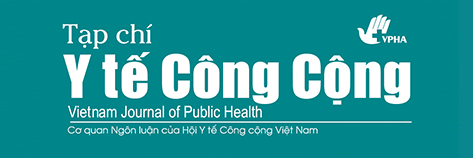Thực hành phát hiện sớm khuyết tật ở trẻ dưới 3 tuổi của người chăm sóc trẻ chính xã Nam Thắng, huyện Tiền Hải, tỉnh Thái Bình năm 2015 (Practice on early detection of disabilities and related factors among caregivers of children under 3 years old in the commune Nam Thang in Tien Hai district located in Thai Binh province in 2015)
Tóm tắt
Phát hiện sớm các khuyết tật ở trẻ em, xác định đúng khó khăn và can thiệp phù hợp sẽ giúp cho trẻ có cơ hội để phát triển hết khả năng của mình. Cha mẹ, người chăm sóc chính (NCSC) của trẻ có vai trò đặc biệt quan trọng trong phát hiện sớm (PHS) khuyết tật ở trẻ. Nghiên cứu của chúng tôi được thực hiện cắt ngang trên 209 NCSC trẻ dưới 3 tuổi tại xã Nam Thắng, huyện Tiền Hải, tỉnh Thái Bình nhằm tìm hiểu thực trạng thực hành phát hiện sớm khuyết tật của NCSC và các yếu tố liên quan. Kết quả cho thấy, tỷ lệ NCSC tham gia có thực hành PHS khuyết tật đạt là 31,6%. Yếu tố tiếp cận với nguồn thông tin về PHS và số lượng trẻ dưới 3 tuổi trong hộ gia đình (HGĐ) có liên quan đến thực hành của NCSC về quan sát, theo dõi sự phát triển của trẻ nhằm PHS khuyết tật. Kết quả nghiên cứu của chúng tôi gợi ý cần phải triển khai một chương trình can thiệp giáo dục và truyền thông toàn diện nhằm nâng cao hiểu biết, qua đó tăng cường thực hành PHS khuyết tật ở trẻ của NCSC.
English abstract
Early detection and early intervention services can help children with disabilities or delays to learn many key skills in order to catch up in their development. Parents and caregivers play an important role in detecting disability. The purpose of our cross-sectional study with 209 caregivers of children under 3 years old in the commune Nam Thang located in the Tien Hai district in Thai Binh province is to identify practices in early detection of disabilities and related factors. The proportions of caregivers having good practices in early detection of disabilities is 31.6%. Accessibility of information resources and the number of children under 3 years old in households are factors related to caregivers’ practices in observations and monitoring child development for early detection. Thus, it is necessary to have a comprehensive education and communication program for improving knowledge and strengthening practices in early detection among caregivers.
Từ khóa
Toàn văn:
PDF (English)##submission.citations##
Tài liệu tiếng Việt
Bộ Lao động - Thương binh và Xã hội và UNICEF (2011), Nghiên cứu định tính về trẻ khuyết tật tại An Giang và Đồng Nai: Kiến thức - Thái độ - Thực hành.
Đỗ Hạnh Nga (2011), "Những khó khăn của gia đình có trẻ khuyết tật phát triển và nhu cầu của họ đối với dịch vụ xã hội", Hội thảo khoa học công tác xã hội - Kết nối và chia sẻ, Trường Đại học Khoa học xã hội và Nhân văn TP. Hồ Chí Minh, TP. Hồ Chí Minh.
Nguyễn Hồng Thuận (1999), Nghiên cứu một số giải pháp kết hợp giáo dục giữa nhà trường và gia đình trong giáo dục mầm non, Hà Nội.
Ủy ban Quốc gia điều tra hậu quả chất hóa học dùng trong chiến tranh Việt Nam (2000), Hậu quả các chất hóa học đã sử dụng trong chiến tranh Việt Nam 1961-1971 - Kỷ yếu công trình, quyển 3, Các tai biến sinh sản, phần hai, Hà Nội.
Tài liệu tiếng Anh
A. Markides (1970), "The Speech of Deaf and Partially Hearing Children with Special Reference to Speech Intelligibility", International Journal of Language & Communication Disorders, 5(2), pg. 126–139.
Center on the Developing Child at Harvard University (2008), The science of early childhood development, pg. 2.
Center on the Developing Child at Harvard University (2010), The foundations of lifelong health are built in early childhood, pg. 29.
Frances Page Glacoe (2003), "Parents' Evaluation of Developmental Status: How Well Do Parents' Concerns Identify Children With Behavioral and Emotional Problems?", Clinical Pediatrics, 42(2), pg. 133.
Frances Page Glascoe and Paul H. Dworkin (1995), "The Role of Parents in the Detection of Developmental and Behavioral Problems", Pediatrics, 95(6), pg. 829-836.
IDEA (1975), Infant and toddle with disabilities, US Department of Education, accessed on Feb. 24, 2016 at http://idea.ed.gov/part-c/statutes#statute-1364, Sec. 631: Findings and policy.
Theeranate K1 and Chuengchitraks S. (2005), "Parent's Evaluation of Developmental Status (PEDS) detects developmental problems compared to Denver II", J Med Assoc Thai, 88(3), pg. 188-192.
National Down Syndrome Society (2012), Early Intervention, accessed 8/8/2015, from http://www.ndss.org/Resources/Therapies-Development/Early-Intervention/.
Nguyen Thi Hoang Yen (2010), Research with families having children with developmental disorder in east Asia.



